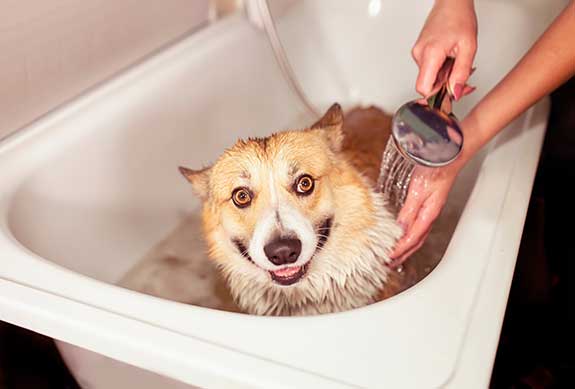Dealing With Pet Allergies as a Pet Owner

Pets are wonder companions, but when their dander or fur starts to trigger your allergies, it can be hard to enjoy their company.
Do you love your pet, but suffer from allergies? Don't worry – you're not alone. Millions of people around the world have to deal with pet allergies every day. Fortunately, there are a few things you can do to make living with pets easier on your allergies, so that you and your beloved pet can coexist in peace.
Disclaimer: These tips are not intended to be proper medical advice and are only recommended if allergies are not severe or life-threatening. Always consult with a doctor or allergist if you have concerns.
Get Tested & Understand Your Allergies
If you suspect that you may be allergic to your pet, it's important to get tested so that you can confirm the allergy and take steps to deal with it effectively. An allergy test can help pinpoint what's triggering your allergic reaction, and you may find that it isn't your pet at all.
If the allergy test does reveal an allergic reaction to your pet, you still need to identify what is causing the reaction. Pet allergies are caused by an immune reaction to pet proteins found in dander, saliva, and urine. In order to correctly identify the allergen, your doctor may recommend doing a series of skin prick tests or blood tests. Once you know what it is you're allergic to, you can then take steps to avoid exposure and minimize your symptoms.
Create an Allergy-Free Zone
If you or someone in your houses is allergic to pets, it's important to create at least one "allergy-free zone." Ideally, this would be the bedroom of whoever is allergic. This should be a safe space with low allergy load, meaning you'll need to keep pet dander (and pets) out of the room. To create an allergy-free zone, start by removing all pet bedding, toys, and food bowls from the room. Then, thoroughly clean all surfaces, using a vacuum with a HEPA filter to remove pet danders from carpets and furniture. You'll also need to do a regular deep clean, and may want to consider steam cleaning carpets and upholstery from time to time.
Invest in High-Quality Air Filters to Help Reduce Allergens in the Air
Pet dander, in particular, is light and airborne, making it hard to remove from your home. The best way to reduce pet dander in the air is to invest in high-quality air purifiers. Air purifiers work by trapping pet dander and other airborne allergens in the filter, allowing you to breathe easier. Some air purifiers even come with pet-specific settings that help to target dander more effectively. If you're looking for relief from pet allergies, investing in an air purifier is a good place to start.
Create a Designated Area in Your Home for Your Pet When You're Not Home
In addition to creating a allergy-free zone, you'll also need to create a designated pet area where your pet can stay when you're not home. This will help to keep the pet hair and dander confined to one area of the house. Even if you don't have full-blown allergies, pet dander and hair can still be irritating.
Ideally, the designated pet zone would be a well-ventilated area that is easy to clean, such as a tile floor or a raised platform. If you have a dog, you may want to consider keeping them in a plastic kennel when you're not home. By confining your pet to one area, it will be easier to keep the house clean and reduce the risk of an allergic reaction. Don't forget to regularly dust and vacuum the designated pet area to help remove pet allergens from their air.
Bathe & Groom Your Pet Regularly to Minimize Shedding

Regular bathing and grooming are key to minimizing pet dander and the symptoms that come with it. While you can't completely prevent shedding, brushing and bathing your pet on a regular basis will help reduce the amount of pet dander in your home. Always be sure to use pet-safe shampoos and grooming products to prevent irritation to your pet's skin.
Keep Your Pet's Bedding Clean & Free of Allergens
Keeping your pet's bedding clean and free of dander means washing it regularly – at least one a week – in hot water. Consider using a pet-friendly laundry detergent that is designed to remove pet hair and dander. You may also want to consider using a hypoallergenic pet bed or placing your pet's bedding in the sun for an hour or two each week, as UV Rays can help to kill pet allergens.
Conclusion
Managing pet allergies can seem daunting, but with the right products and a little big of know-how, you and your pet can live comfortably together.
Shop Petmate's selection of dog and cat products today, including grooming products, machine-washable bedding, and more.
Previous article

Next article

Related posts
View all-

Holiday Gifts for Every Pet Personality: The Ultimate Guide
The holiday season is finally here, and for many of us, that means finding the perfect presents for the ones we love most—our pets. Whether they are a steadfast dog who never leaves your side or an independent cat who graces you with their presence on their own terms, our pets are cherished members of the family. They deserve to celebrate right alongside us, stocking stuffers and all.
Read Article -

How to Keep Your Pet Calm During Thanksgiving
Thanksgiving is a time for family, friends, and food, but for our pets, the holiday can be overwhelming. The sudden change in routine, unfamiliar faces and scents, and increased noise can trigger significant stress. Understanding why your pet might feel anxious is the first step toward creating a peaceful holiday experience for everyone, including your furry family members. This guide offers calming tips for pets and practical solutions to ensure your dog or cat feels safe and secure during the festivities.
Read Article -

Top Travel Essentials for Pets This Holiday Season
Holiday travel often means bringing the whole family along, and for many of us, that includes our furry companions. Preparing for holiday pet travel is about more than just packing a bag; it's about ensuring your pet's safety, comfort, and happiness from the moment you leave home until you return. A little planning helps reduce stress for both you and your pet, making the journey a positive experience for everyone involved.
Read Article



